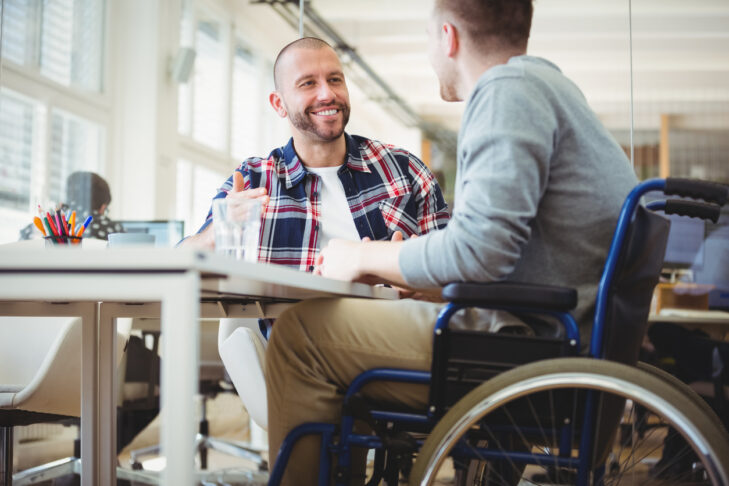For years, the Jewish community has recognized Jewish disability and inclusion throughout the month of February. The Ruderman Synagogue Inclusion Project (RSIP), a partnership between CJP and the Ruderman Family Foundation, supports synagogues in creating communities where people of all abilities are valued equally and participate fully. RSIP is thrilled to be continuing our tradition of honoring Jewish disability inclusion awareness this February. Inclusion can seem like an overwhelming challenge. We’ve got good news—there are many steps that you can take today that will make a difference.
Why You Should Join Us
- Raise awareness and affirm that inclusion and belonging are essential to well-being and quality of life of all people, including people with disabilities, mental health conditions and those who love them.
- Underscore the importance of choosing one’s own Jewish journey.
- Support people with disabilities and mental health conditions to participate in all aspects of community life—as they choose.
- Be part of a global initiative to support participation and involvement in Jewish life.
- Advocate for the civil rights of people with disabilities and mental health conditions.
- Understand and overcome stigma, prejudice, biases, stereotypes, and myths about disability and mental health conditions.
Where To Start
- Here: There are many places to begin! Explore these first steps. RSIP can also help you access consultants and network with congregations who have undertaken this important work.
- On JewishBoston: Find resources, events and education for people with special needs and their families; and you’ll learn how to create an inclusive community, read personal stories and more.
- Events and webinars: Share this central calendar of disability and inclusion events in Greater Boston and online—and add yours to it! RSIP also offers a variety of events and webinars around mental health.
- Resources and solutions: Becoming more inclusive involves changing how we think, how we act, and how we use our physical space and other resources. You’ll find articles and policies authored by inclusion experts as well as best practice examples from other congregations. We’ve got helpful advice on everything from learning how to get feedback on your inclusion efforts, how to address food allergies, and how to create inclusive b’nei mitzvahs to how to welcome people of all abilities.
- Reflections: Our differences can challenge, strengthen, and even inspire us. See what you can learn from these thoughtful writers, parents, professionals, and congregants who have experienced the difference that an inclusive community can make for everyone.
Grab Your Group, Establish Your Goals
Invite your inclusion committee (or start one), representatives from other committees, clergy and professional staff, and people with disabilities and mental health conditions and their family members (Think: “Nothing about us without us!”). Once you’ve done so:
- Set goals for what you can accomplish during the month
- Brainstorm activities and programs, asking how each activity will have an impact after February
- Make February the springboard for what you can do the rest of the year
- Discuss the weekly Torah parshiot with an inclusion lens in board and committee meetings, religious school classes, Shabbat sermons, and in Torah study
- Use social media to promote inclusion
Event and Program Ideas
- Host a congregational Havdalah service on Zoom. Advertise this to your entire community and encourage people with disabilities and their families to participate.
- Choose a film about people with disabilities and do a “movie night.” Choose a film that people can stream and host a discussion. Have a thoughtful discussion about how people with disabilities and mental health conditions are portrayed in Hollywood.
- Coordinate a program for parents of children with disabilities. Invite a speaker to lead a parent education group.
- Schedule a Shabbat afternoon conversation on Zoom. Invite a speaker to discuss employment, housing, or policy issues around disability and mental health conditions.
- Start a book group and read a book about and/or by people with disabilities.
- Host a bedtime story event on Zoom. Read a relevant book for kids—make sure to have hot chocolate and marshmallows at the ready!
- Gather representatives from every Jewish organization to convene an inclusion roundtable that will meet regularly after February to discuss the needs and work toward building capacity in the community
Updated from CJP’s February 2022 inclusion guide.


